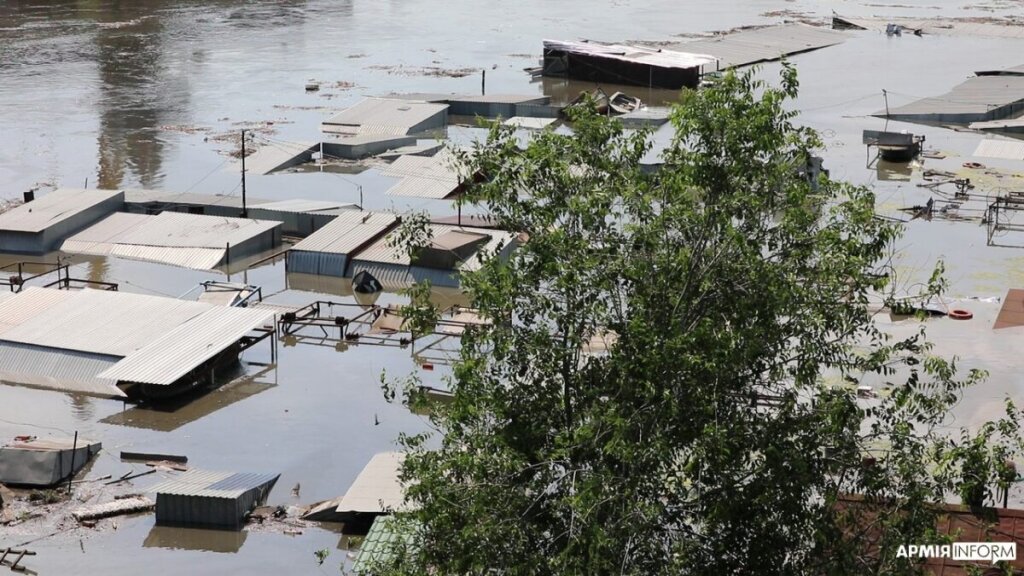This panel will discuss the devastating consequences of the Kakhovka Dam destruction for the Ukrainian ecosystem and residents. The panelists will review the current rescue effort and put it in historical perspective. Special attention will be devoted to the environmental impact of the explosion, why the Kakhovka Dam destruction can be considered a case of ecocide and what it means for the environmental changes in Ukraine and the Black Sea basin. Panelists will focus on the history of dam construction during the Soviet period and the effects this part of the industrialization program had on the Ukrainian population and environment. Finally, the panelists will assess the humanitarian crisis, societal response, and rescue efforts.
This event will be held virtually on Zoom.
SPEAKERS
Maria Faticov, Postdoctoral Fellow at Faculty of Sciences of Université de Sherbrooke
Nataliia Laas, Postdoctoral Fellow at NYU Jordan Center for the Advanced Study of Russia
Olha Vorozhbyt, Journalist and Researcher, Deputy Editor-in-Shief of “Ukrayinskyi Tyzhden”
Moderated by:
Anastasiia Vlasenko, Postdoctoral Fellow at NYU Jordan Center for the Advanced Study of Russia
BIOS
Maria Faticov is a postdoctoral fellow at the Faculty of Sciences of Université de Sherbrooke in the province of Québec, Canada. Maria is an ecologist, who is largely interested in the processes structuring microbial communities associated with plants and animals. Currently, Maria explores the complex interactions between the tree microbiome, the air microbiome and human health in the urban environment. Maria did her Ph.D. at the Department of Ecology, Environment and Plant Sciences at Stockholm University in 2021, she obtained her M.Sc. from the Department of Biology at Helsinki University in 2015, and B. A. in Ecology, Environmental Protection and Sustainable Development from the National University of Kyiv-Mohyla Academy in 2012. During her academic journey, Maria actively participated in several environmental NGOs, including Finnish Association for Nature Conservation. In these roles, she focused on gathering information on endangered plant and fungal species while advocating for the establishment of new protected areas. With a firm belief in promoting a more equitable and tolerant world, Maria places great importance on the conservation of nature.
Nataliia Laas specializes in political economy, consumer society, gender, the history of the social sciences, and environmental history in the Soviet Union. She currently works on a book manuscript, provisionally titled A Soviet Consumer Republic: Economic Citizenship and the Economy of Waste in the Post-WWII Soviet Union. This project departs from the standard economy-of-shortages narrative and offers a different dimension, an “economy of waste,” to describe Soviet consumption. It argues that after World War II and especially with the onset of Cold War competition with the West, in addition to periodic shortages the Soviet state regularly confronted a new challenge: glutted markets, overproducing factories, and excess commodities. Unlike shortages that were often vindicated by the official Bolshevik ideology as the people’s sacrifice on the road to the country’s industrialization and economic growth, excess and waste were endemic to the malfunctioning of a command economy but far more difficult for authorities to explain and justify. By focusing on the emergence of socialist market research and consumer studies, the book explores how the economy of waste reshaped relationships between the state and its citizens. Laas received her PhD in History from Brandeis University in 2022. Her doctoral dissertation was supported by a Harriman Institute Carnegie Research Grant and a Mellon Dissertation Completion Fellowship from Brandeis, among others.
Olha Vorozhbyt is a Ukrainian journalist and researcher. Currently she works as a deputy editor-in-chief of “Ukrayinskyi Tyzhden” (www.tyzhden.ua), a Ukrainian online-media publication. Since 2013 Olha has worked as a journalist and observer in various Ukrainian and European media. In 2014 she worked with the German ARD Channel as a local producer focusing on the MH17 crash investigation. In 2014-2021 she worked as a foreign desk observer for the Ukrainian weekly “Tyzhden”. For over a decade, Olha worked with the East European Development Institute, a non-governmental organization in Ukraine, where her research focused on post-coloniality and the development of South Asian countries. Since 2018 she has served as an affiliated expert with the Foreign Policy Council “Ukrainian Prism”, a network-based non-governmental analytical center, where her research focuses on Ukrainian relations with the countries of South Asia. Olha graduated from the National University of Kyiv Mohyla Academy in 2013 with an MA in European and German Studies. She is currently pursuing her PhD at Ivan Franko National University of Lviv.
Anastasiia Vlasenko is a postdoctoral fellow who studies electoral politics and democratization with specialization in politics of Ukraine and Russia. Her monograph project, ‘The Electoral Effects of Decentralization: Evidence from Ukraine’ investigates how decentralization reform affects electoral mobilization and diversity in a weakly institutionalized democracy. Vlasenko is particularly interested in transitional period reforms, propaganda, legislative politics, and forecasting. Her research has been published in the Journal of Politics. She received her Ph.D. from the Department of Political Science at Florida State University in 2022, M.A. in Political Science from Florida State University in 2018, M.A. in International Relations from New York University in 2016, and M.Sc. in European Affairs from Lund University in 2013, and B.A. in Political Science from the National University of Kyiv-Mohyla Academy in 2011. In 2020-2021, she worked at Hertie School in Berlin as a visiting researcher. In 2014-2016, Vlasenko was a Fulbright scholar at New York University. At Florida State University, she taught courses on comparative politics and post-Soviet studies.

